This is an automatically translated article.
Infant nutrition has a great influence on a child's growth and functional development. Low and high intakes of protein or amino acids can both cause adverse effects. Supplementation of lysine for infants is necessary for cases where there is a lack of supply from foods.1. Lysine overview
Unlike other amino acids, lysine is classified as essential amino acids, meaning that the body cannot synthesize it and depends entirely on external food. Lysine is found in meat, fish, eggs, dairy, and several different legumes such as soybeans.Lysine is an essential amino acid used primarily by the body for protein synthesis. In addition, lysine, along with methionine, is required for the biosynthesis of carnitine, which is required for fatty acid metabolism. Lysine was the first limiting amino acid in an all-grain diet chosen by a large proportion of the world's population. Lysine deficiency interferes with protein synthesis and causes weight loss in infants. Conversely, excess lysine also reduces the growth rate of animals due to unbalanced diets. Therefore, the amount of amino acids that need to be supplemented by the body is very important for the rate of protein synthesis and growth.
2. Proper lysine supplementation for children
Generally, lysine is not widely recommended for use in infants and young children. Most children are assessed to be able to get their lysine needs through a healthy diet and do not require additional oral supplements.Lysine can be produced in many forms such as capsules, powder, liquid. Lysine for children under 1 year old or lysine for children 2 years old are often combined in vitamins for children. To be more suitable, products often add flavorings to make it easier for babies to swallow without feeling uncomfortable.

Bổ sung lysine cho trẻ sơ sinh là việc làm quan trọng cần tham khảo ý kiến của bác sĩ
3. Notes when supplementing lysine for infants
Currently, only a handful of studies have been performed in infants to determine the infant's need for lysine supplementation. The goals of assessing dietary lysine are nitrogen balance and growth rate, although these may not be the most sensitive methods.WHO experts have recommended a balanced lysine intake of 119 mg/kg/day for exclusively breastfed infants under 6 months of age, although there is currently a lack of evidence. clinical trial.
In particular, the long-term supplementation of lysine to infants can lead to nitrogen imbalance in the body. This imbalance has a negative impact on the metabolic system such as damaging the functioning of the kidneys. Therefore, before deciding to supplement lysine for babies, parents need to consult with doctors.
In case children need to supplement with lysine, the improvement may take place for a long time, so it is recommended that parents be calm and persistent when supplementing with substances for their children, either through food or functional foods. . In particular, the use of functional foods should choose those of natural origin that are easily absorbed, do not allow simultaneous use of many types or continuously change the types of functional foods.
For more nutritional knowledge and child care for each age, parents should regularly visit the website vimec.com and make an appointment with the leading doctors, pediatric and nutrition experts of the National General Hospital. Vinmec when needing advice on children's health.













